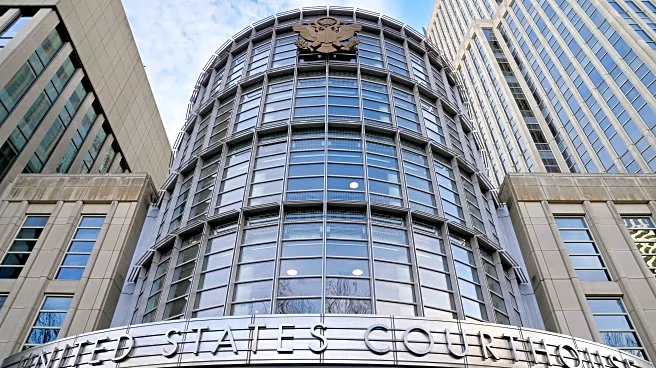NEW YORK (AP) — A convicted drug dealer who had been granted clemency by President Donald Trump was sent back to federal prison on Monday for violating the terms of his release after being charged with several new crimes.
Jonathan Braun was sentenced to 27 months behind bars.
The Long Island man had been accused of swinging an IV pole at a hospital nurse and threatening to kill her, screaming at a member of his synagogue, groping his family’s nanny
and evading bridge tolls.
Brooklyn federal Judge Kiyo Matsumoto said she hoped Braun's “expressions of remorse” and promises to “lead a law abiding life” were in good faith, noting that many of the people who he had harmed have since forgiven him.
“Don’t squander it,” she said to Braun.
Prosecutors had sought a five-year sentence, the maximum punishment allowed, arguing that a lengthy stint behind bars was “necessary to protect the public from further crimes.”
“The defendant’s brazen and violent conduct caused fear and terror in his victims,” prosecutors wrote in a court filing ahead of his sentencing. Braun, they said, has continued to show that he is a “serious danger to the community."
Braun has been locked up at a federal jail in Brooklyn since his arrest in April for violating the terms of his release. That time will be subtracted from his sentence.
Braun’s federal public defender, Kathryn Wozencroft, had sought for him to be released immediately.
Since returning to jail, she said, Braun has been meeting with a psychiatrist, gotten sober and worked to rebuild his faith and community support, talking with a rabbi twice a week and expressing remorse to him for his actions. Braun's conduct, she said, was driven by addiction.
“The past seven months in custody have given Mr. Braun significant time to reflect on the very serious harm his behavior caused, and to take steps to ensure that he can be successful on supervision moving forward,” Wozencroft wrote to the judge ahead of the hearing.
Braun was sentenced to 10 years in federal prison in 2019 after pleading guilty to drug-related charges. He served about a year behind bars before Trump commuted his sentence in the final days of his first term in January 2021. Braun was freed from prison, but the rest of his sentence remained intact, including requirements that he pay a fine and stay out of trouble.
Braun had been a high-ranking member of an international group that smuggled more than 100,000 kilograms (220,460 pounds) of marijuana from Canada into the United States, federal prosecutors said at the time.
In January, prosecutors said, Braun cursed at nurses and argued with an assistant nurse manager in the emergency department at a Long Island hospital, picking up an IV pole that was connected to his arm and swinging it in her direction as she approached and attempted to calm him down.
Braun's wife was also screaming at hospital staff, prosecutors said. When the assistant nurse manager said that she would have to leave, Braun tore into the assistant nurse manager, walking toward her until he was stopped by hospital security, yelling profanities and repeatedly saying that he was going to kill her, prosecutors said.
In February, prosecutors said, Braun entered the bedroom of his children’ family’s live-in nanny, wrapped an arm around her upper body and used the other to put her in a headlock before grabbing her breasts and making unwanted sexual advances. The nanny testified in court that Braun’s actions made her so uncomfortable that she locked herself in a bathroom, called her husband and asked him to notify police.
In March, prosecutors said, Braun grabbed and threatened a fellow worshipper who asked him to be quiet during a synagogue service. After stepping away for about 10 minutes, Braun allegedly got in the man's face, squeezed his right arm tightly and asked him: “Do you know who I am?” and “Do you know what I could have done to do you?”
Braun's infractions didn't end there. Last summer, police said, he evaded bridge tolls at least 40 times while driving his luxury cars, accruing $160 in unpaid fees.
He also failed to make payments towards his court-ordered fine despite living in a multimillion-dollar home and driving luxury vehicles, prosecutors said, and he failed to make “truthful and complete financial disclosures” to probation officials, including proof of full-time employment.















